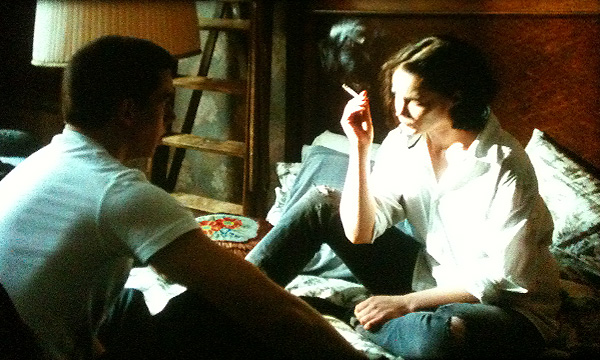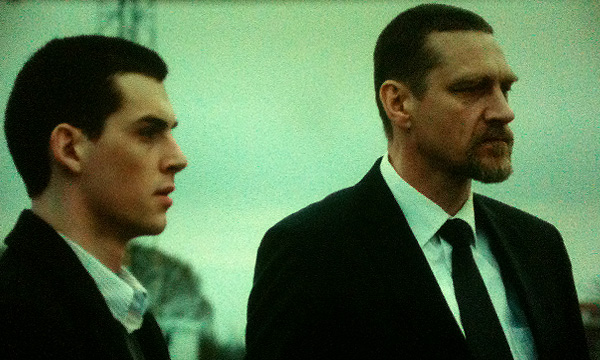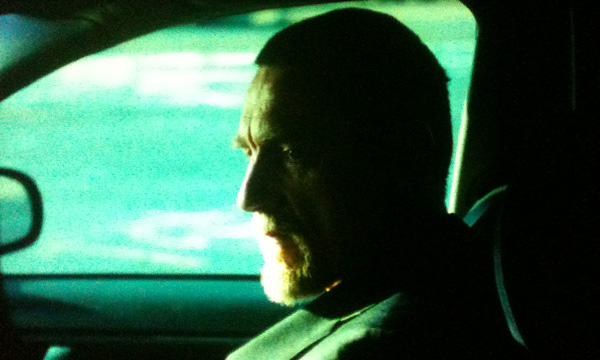Bad Family explores issues and deviations of what’s supposed to be the average upper Finnish bourgeoisie. Mikael Lindgren (Ville Virtanen), a Public Prosecutor, is a well-off and apparently accomplished man. He has two sons: the older one, Dani, comes from a previous failed marriage. Dani is still a young man in high school, but Mikael has an extremely demanding relationship with his older son, expecting from him the same degree of personal success as the one he managed to achieve. One day the family receives a call, reporting the death of Mikael’s former wife – Dani’s mother. The woman, who was leading a disorderly life, didn’t even have her own place to stay or anybody in the world to pay for her funeral expenses. All she leaves behind is a daughter, Tilda. Tilda is also Mikael’s daughter. She’s a little older than Dani and like her mother she’s a troubled – and troublesome – person. Her mother, at the moment of deserting the rest of her family, brought Tilda with her before they both disappeared for the next sixteen years. The girl represents for Mikael disruption in his presently perfectly adjusted family. For Dani, her brother, she’s everything he has never known: uncommonness and lack of prejudices, freedom and ignorance of bourgeois pressuring demands. And of course she is also the lost tie with his own mother. For Tilda, on the other hand, Dani seems to be the source of the affection she has never been offered by anybody in her life. Both Dani and Tilda at first seek refuge each in their own way in the reassuring presence of the sibling; their closeness is oblivious of the prejudices that are one of the strongest issues of society. But adults do remember about those prejudices and most of the time the opinions they form of their world is heavily based on them. Soon Mikael is lead to suspect Tilda and Dani have an affair, which of course he is intentioned to end. Through a series of misconceptions the suspicion becomes belief and Mikael tries everything in his power, even the craziest plots, to separate the siblings. In the end, as the old saying goes, opportunity makes a thief, and maybe also thanks to the negative influence of their father’s obsessive belief, Tilda and Dani are bound to fall in love.



Here we go again with a film about a dysfunctional family and its inner tragedies, mostly originating from ineffectual communication between its members. Don’t be fooled by the ending credits of this film. Aki Kaurismaki produced it, but not all Finnish films produced by Kaurismaki actually feel like Kaurismaki. Despite superficial similarities, Bad Family‘s outlook on human relations significantly differs from Kaurismaki’s. Salmenperä doesn’t manage to handle his material in the most adequate way. I have to admit that from the synopsis I had read I was expecting something more in the style of Kaurismaki myself. The story of this Finnish family lacks in my opinion some sensible development, especially in the characters’ area. All characters are sort of inconsistent, they lack the strength to become well-rounded persons; they remain erratic figures, staring a lot at each others or at the camera, weeping in front of it frequently, but ultimately saying nothing of themselves that would be truly relevant to know. Differently from Kaurismaki’s characters, who have, even when they remain silent or perfectly still, an irresistible romantic aura strongly perceivable by the viewer, the characters in Salmenperä’s film are nothing more than uninteresting figures affected by their ineptitude.
The use of close-ups is almost outrageous throughout the film. The environment surrounding the characters is merely functional to their dialogues or silent weeping. The viewer is never really given the opportunity to reflect on the situation by placing it in an appropriate dimension. The face of all characters compulsively fills the screen, without space for anything else. Close-ups are usually an effective way to depict inner emotions when wisely used in moderation. Remember the meaningful and breathtaking close-up of Karina in the cinema in Vivre sa vie – in reference to Dreyer’s The passion of Joan of Arc, another extraordinary example of how close-ups can effectively work in the exploration of the human soul. Looking at the usual Kaurismaki in Finnish cinema, exemplary cases like the overwhelming close-up of Koistinen at the end of Lights in the Dusk come to mind. Sadly, not a single close-up in Bad Family can get even slightly close to that intensity. Overabundance and insignificant acting prevent the film from achieving that. Actors remain people acting in front of the camera and their performances stay on a weak and generic level. Ville Virtanen is the only one that with his bleak stares conveys some kind of emotional meaningfulness, despite, or thanks to, his deadpan fixity. But you cannot have even the most exquisite actor in front of the camera like that for such a prolonged time without the risk of banalizing everything, let alone a merely decent one. The cinematography doesn’t help either, as it confers the film the mediocre look of a TV feature, without any remarkable aspect to it. The use of the music is also kind of unoriginal, with the recurring music box theme becoming more and more annoying as the film progresses. The script is another not too well-balanced aspect in the film’s economy. Some irrelevant aspects are over-analyzed to the point of saturation while others that would have been necessary to save some of the characters from adhering too strictly to a stereotype are completely marginalized.
Salmenperä, writer and director, doesn’t ultimately seem to know what he wants from his creation. Telling a story? Exposing an issue? Making the audience sympathize with his characters? Alienating the audience’s sympathy through estrangement? All these things together? He doesn’t seem to be able to make a point in any way, and he left me with the feeling most of the elements in the film have been misplaced.
Title: Paha Perhe (Bad Family)
Year: 2010
Director: Aleksi Salmenperä
Genre: Drama
Country: Finland
Runtime: 90 minutes
Language: Finnish
This film is now featured on the Cinematographers’ World Conference in Budapest. 🙂 See http://www.hscmot.hu